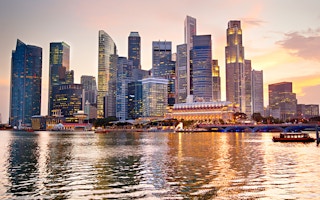The 100 most sustainable companies in the world were revealed on Thursday in Davos, Switzerland, with an Asian company clinching a spot in the top 10 of the annual ranking for the first time in its 11-year history.
Singapore real estate developer Keppel Land ranked fourth on the 2015 Global 100 Most Sustainable Corporations in the World index (Global 100), which was released by Canadian investment advisory firm Corporate Knights at the sidelines of the World Economic Forum meeting.
Other Singapore companies that made it to the index were telecommunications company Starhub (24), real estate developers City Developments Limited (34) and CapitaLand (84).
They were among the 11 Asian countries that made the top 100 list, along with Chinese computer company Lenovo, Japanese pharmaceutical company Eisai, Hong Kong’s Hang Seng Bank, and South Korean electronics manufacturers LG Electronics and Samsung.
That Singapore has such a large representation on the index despite its small size is a testament to “the island state’s ethic of resource productivity and transparency, which are underpinned by good public policy”, said Toby Heaps, chief executive of Corporate Knights.
He noted that the presence of Asian firms on the list has grown significantly since the index was first launched in 2005, adding that not a single Asian country except for Japan featured on the list in its first year.
“I expect this upward trend to continue as Asia grows, and companies come under increasing pressure to be more accountable and resource productive,” he told Eco-Business.
Keppel Land was ranked high for its sustainability efforts, which include getting all existing properties certified under the Singapore government’s green building rating scheme and encouraging tenants to use energy-efficient lighting and water saving fittings.
The performance appraisal of Keppel’s project managers is linked to meeting environmental and safety targets, and the company also adheres to international certification standards on environmental management, occupational health and safety, and sustainability reporting, among others.
Ang Wee Gee, chief executive of Keppel Land, noted that “this recognition spurs us to push ahead in our sustainability journey”.
Esther An, City Developments chief sustainability officer, added that being the only Singapore company to have been ranked for six years in a row was “an affirmation that our sustainability efforts are in line with international best practices”.
Heaps said that the new index showed awareness on sustainability was growing, especially in Asian countries and the real estate sector.
“Developers now, more than ever, are convinced that incorporating sustainability in their business models is no longer an option, but a necessity,” he said.
“
I expect this upward trend to continue as Asia grows, and companies come under increasing pressure to be more accountable and resource productive.
Toby Heaps, chief executive officer, Corporate Knights
Corporate Knight’s index evaluates listed companies around the world which have a market capitalisation of more than US$2 billion, and assesses them against a set of 12 indicators, including resource productivity, the gender diversity on a company’s board, taxes paid, and the ratio of an average worker’s pay to that of top management.
For resource productivity, for example, companies are assessed on their energy and water use, waste generated, and greenhouse gas emissions relative to the company’s total revenue.
A total of 4,096 companies across various industries were considered for this year’s ranking. Companies from sectors including biotechnology, pharmaceuticals, consumer products, software, energy, and real estate were ranked within their own industry groups, with the top performers for each sector named in the final Global 100 Index.
The top spot on the ranking was clinched by American biotechnology firm Biogen Idec, which provides medicine to treat ailments such as haemophilia, multiple sclerosis and Alzheimer’s disease.
Adrian Gottschalk, Biogen’s senior vice president and managing director for Japan, expressed pride in topping the index this year, up from its second position last year. “Our commitment to corporate citizenship and environmental sustainability reflects the best interests of the communities in which we operate,” he told Eco-Business.
The 2015 Global 100 index also revealed that 85 per cent of the companies listed on the index linked the bonus paid to executives with their ability to delivery on sustainability targets. Companies such as Philips Electronics and Schneider Electric, for example, pegged the bonuses paid to top executives to achieving carbon emissions reductions.

















